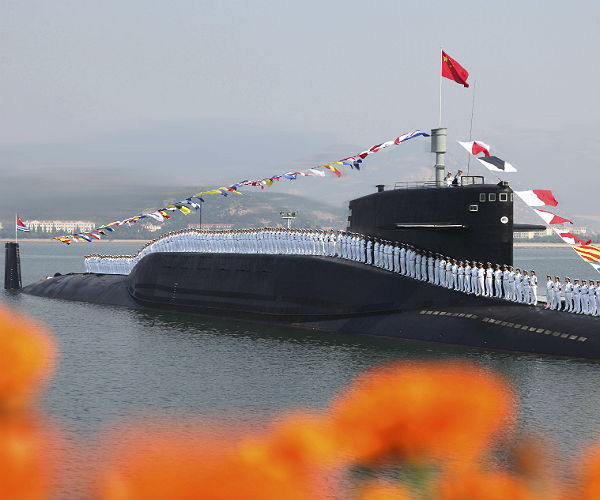The multinational Code for Unplanned Encounters at Sea (CUES), which
was once praised as a major step in U.S.-China military relations
last year, now doesn't seem to hold much weight as a Chinese
submarine conducted a simulated cruise missile attack on the
aircraft carrier USS Reagan during a close encounter several weeks
ago,
reports.
In an effort to prevent accidents or "mishaps," the non-binding 2014
CUES agreement states that commanders at sea should avoid
"simulation of attacks by aiming guns, missiles, fire control radar,
torpedo tubes or other weapons in the direction of vessels or
aircraft encountered."
The Free Beacon notes that although the incident occurred during the
weekend of Oct. 24, the Obama administration has kept the details of
submarine targeting under wraps "to avoid upsetting military
relations between the Pentagon and the People's Liberation Army."
Although Adm. Harry Harris, Commander of the U.S. Pacific Command,
did not deny that the incident occurred, when asked via email about
it, he side-swiped the question stating, "I have nothing for you."
"I cannot discuss submarine operations, reports of submarine
operations, or rumors of submarine operations," added Pacific
Command spokesman Capt. Darryn James. "I can tell you that we are
completely confident in the effectiveness and capabilities of the
ships and aircraft of the forward-deployed naval force."
However, members on Capitol Hill, including the chairman of the
House Armed Services subcommittee on sea power Rep. Randy
Forbes, R-Va., are concerned by the recent reports.
"If true, this would be yet another case of China trying to show
us that they can hold our forces in the region at risk," said
Forbes.
"Coming on the heels of anti-satellite tests and other
demonstrations, this latest incident should be a reminder of the
destabilizing course that China is on and the challenges we face
in maintaining a stable military balance in the Asia-Pacific
region," Forbes added.
According to the Free Beacon, China military specialist at the
International Assessment and Strategy Center Rick Fisher noted
that the Chinese navy "operates several types of submarines
capable of firing anti-ship cruise missiles."
Additionally, eight of China's 12 Russian-made Kilo-class
submarines have the capacity to fire Club anti-ship missiles
with a range of up to 137 miles.
"Even though China would have been at fault for the incident,
the Chinese government would likely then use it as an excuse for
initiating a series of attacks or incidents against U.S. naval
forces," said Fisher.
He added that the incident, "certainly runs counter to a 2014
U.S.-China agreement to avoid such incidents at sea, which could
indicate that China may have little intention to honor such this
or other military confidence building agreements."
The Free Beacon reports that "a Chinese Embassy spokesman did
not respond to an email request for comment."
© 2015 Newsmax. All rights reserved.
